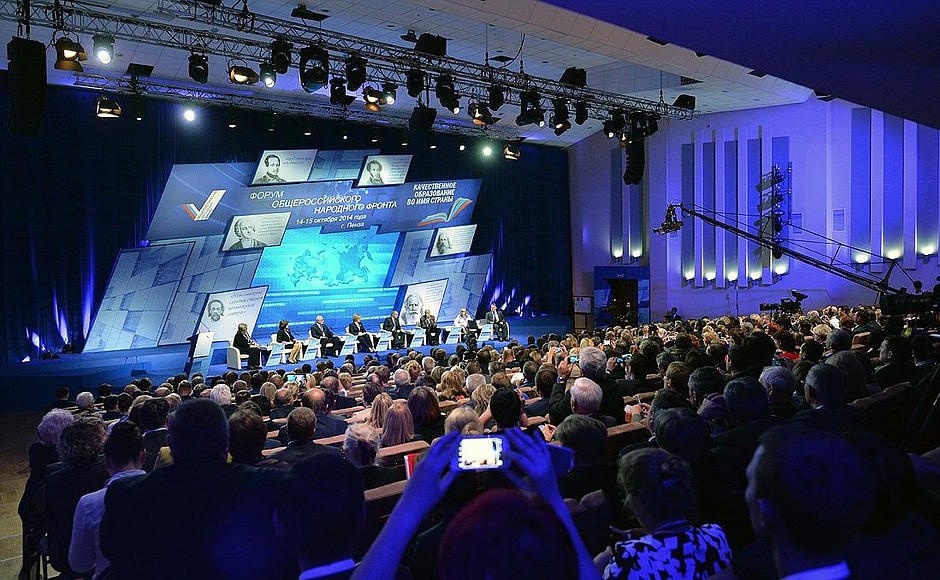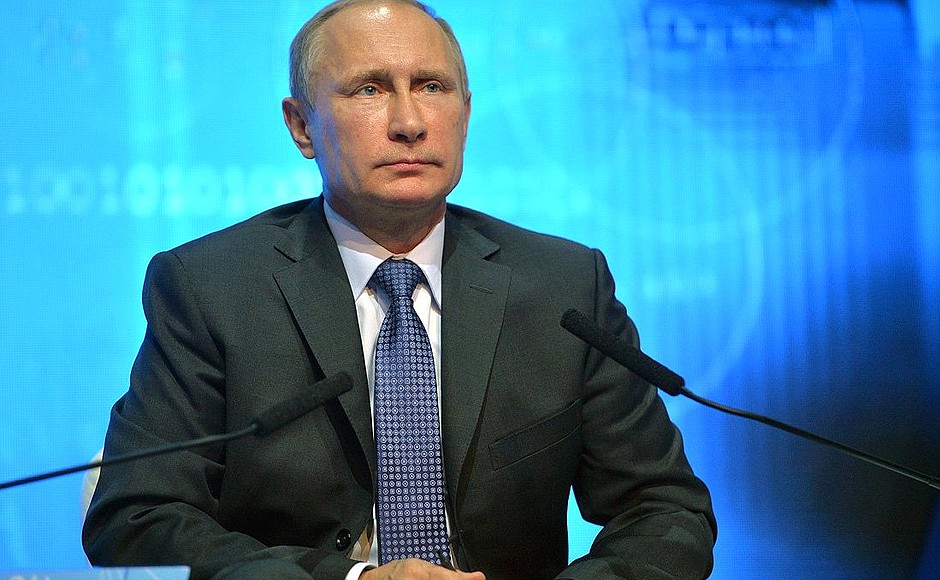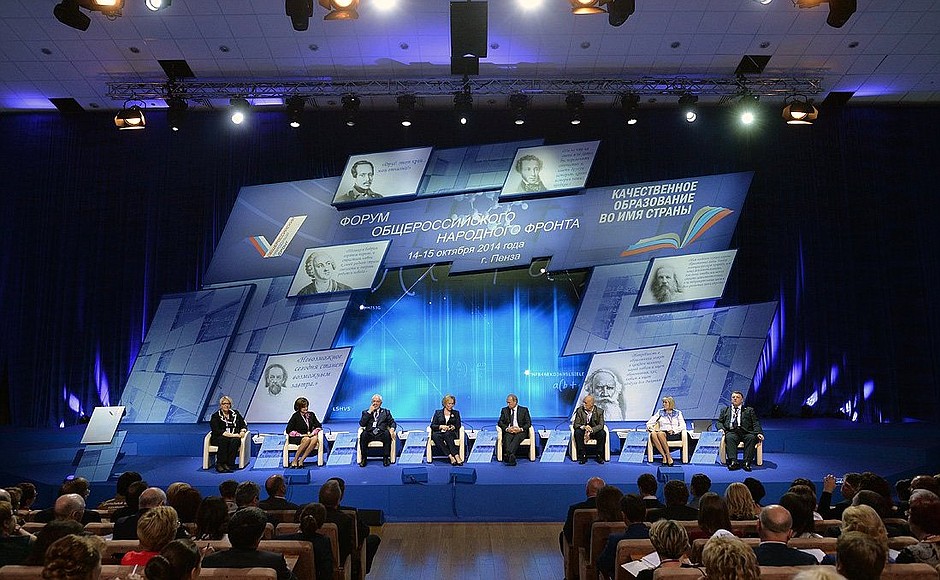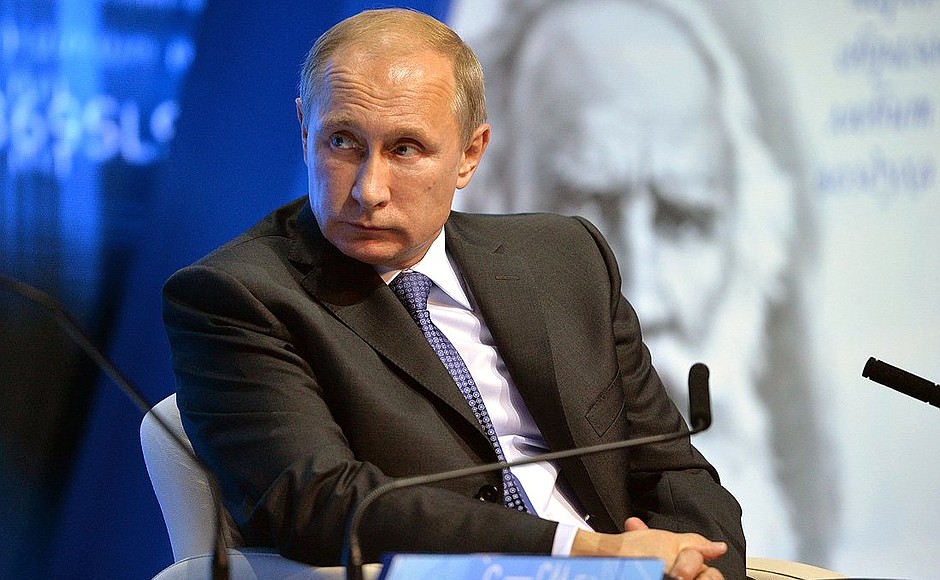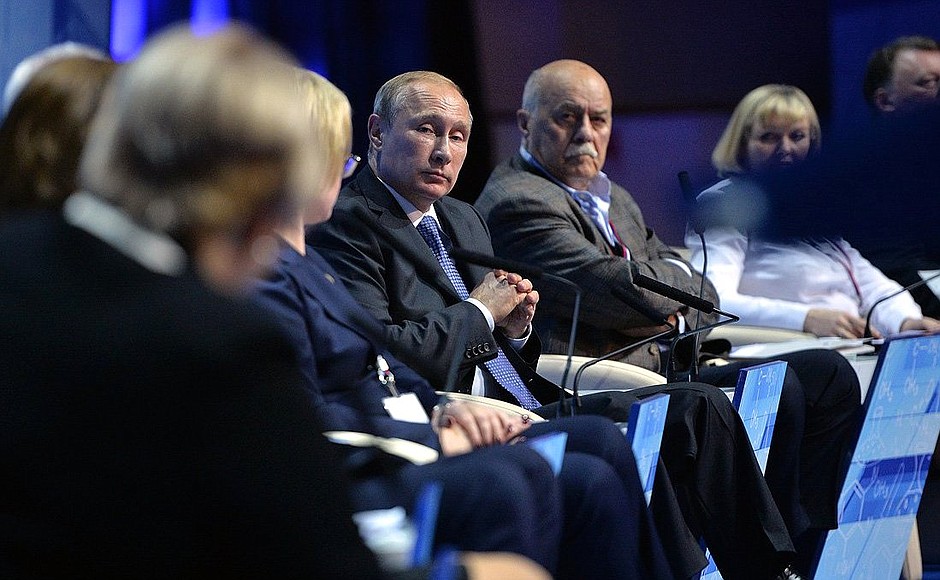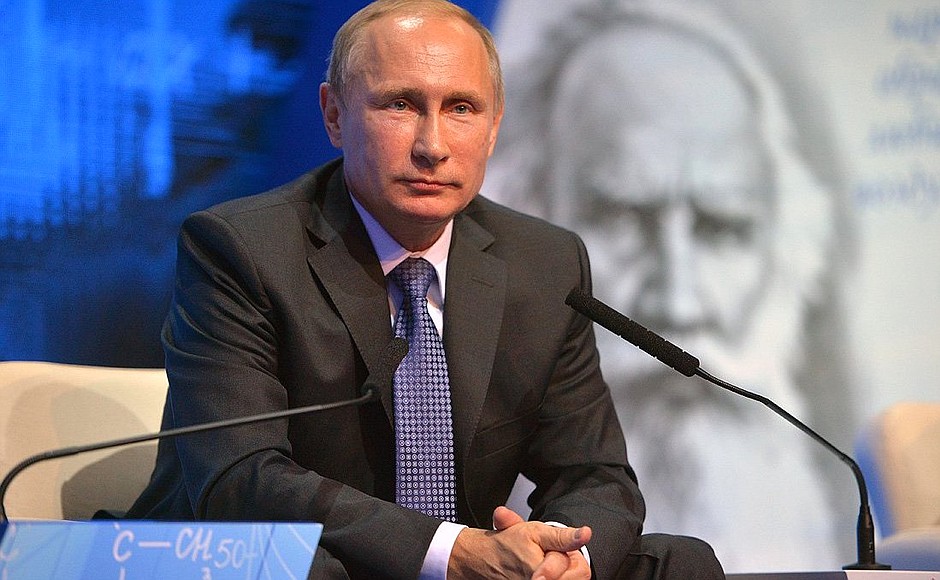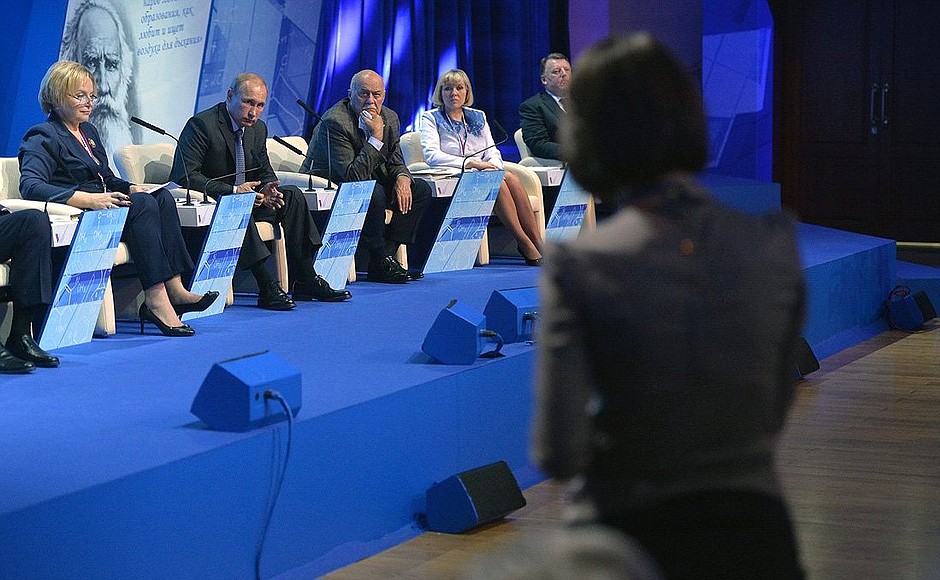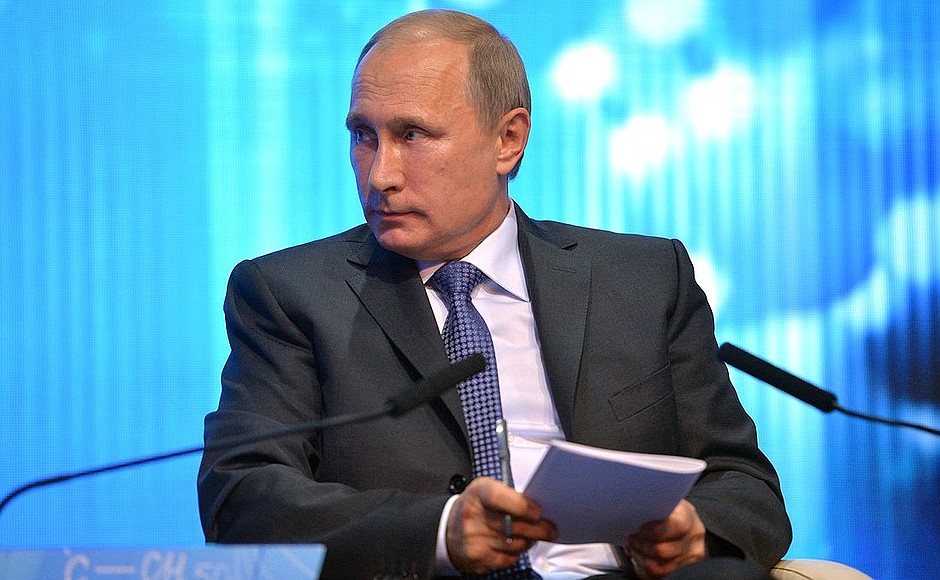The forum has brought together more than 500 participants – ONF activists, teachers, parents, expert community representatives, officials from relevant ministries and agencies, State Duma deputies, senators, and members of the Civic Chamber.
* * *
Excerpts from transcript of Russian Popular Front’s Forum Quality Education for the Country’s Good
President of Russia Vladimir Putin: Good afternoon, friends,
I know that you have already been working hard. I am pleased to note that this is not the first time we are addressing issues concerning education.
I want to start though by congratulating everyone who holds the Russian culture, language and literature dear. Today, 200 years ago, Mikhail Lermontov was born. I have finally visited Tarkhany and seen where our great poet grew up.
His life and works have given rise to much debate. People argue to this day about Lermontov’s political views. He was a complex person, a very interesting figure. But no matter what the arguments, no one can deny the obvious, namely, that he was a genius – our genius.
There is no question that Mikhail Lermontov was a patriot. People might see this in different ways and give different meanings to the concept, but there is no disputing the fact itself.
It is very good that we have chosen today to address matters that concern us, problems that concern each and every person in every family.
See also
Let me say first of all that today’s discussion is not starting from scratch. We have improved the education infrastructure over recent years. I am referring to simple but nonetheless important things such as repairing many schools, building school sports facilities, and providing schools with modern computer classrooms. Also very important is that teachers’ social status has been raised and their wages increased.
I know there will surely be proposals today to do more in these areas, but we have nonetheless already made progress, and I can assure you that I personally and all concerned will continue to give this matter our utmost attention.
Significant resources from the federal and regional budgets have made it possible to resolve quite a few problems. Our people are noting the changes too and the public is expressing greater satisfaction with the education system. I will not repeat the statistics, which are open information that you can see for yourselves, but this really is the situation.
At the same though, we do need to keep going further. New technology and even new professions appear all the time. Most important of all, our citizens have higher expectations and so we must make every effort to offer quality teaching that meets today’s demands and will prepare the citizens and specialists our country will need to keep up with the demands of the times.
We need to keep working so that schoolchildren receive a solid base of learning no matter where they live and what their parents’ social status is, so that they can then use this base to master future professions, achieve success, find a place for themselves and be useful to their country, and enjoy life to its fullest.
I will repeat again that school must provide more than knowledge. We should not forget that teaching in secondary or high school is, first and foremost, an education. That is what our outstanding humanist, academician Dmitry Likhachev, said. He also said that teachers in Russia have always been “the masterminds of young people’s dreams.”
This is a difficult time for teachers – I would even say, a very difficult time – because the flow of information is such that it is very difficult to fulfil this function as a “mastermind of young people’s dreams.” We didn’t have this before, but we do now. And in order to meet this challenge, we need knowledge, talent, and the desire to improve. These information flows can be positive, but they can also be destructive to any individual, especially a young one. We know of examples in some nations that, unfortunately, often lose both the pedagogical and humanistic component of education. I think this will backfire for many of them.
What are we observing today? An uptick in nationalism, at least in some places, and the decline of family and moral values, cultural traditions and identity. This typically does not end well. Clearly, the mission of a school is to set benchmarks that define actions, decisions and setting goals. And a teacher must teach students to tell the difference between truth and lies, to help develop a life stance.
Here is what I would like to note. As I already said, problems in education affect every citizen in our nation. So it is essential to have public consensus on all issues pertaining to further developing education overall, and school education in particular. There are no little things here. The contents of educational programmes are just as important, as are an educator’s qualifications and the state of school buildings and equipment. And I repeat again, the responsibility of a teacher for the quality and results of his or her work is very, very high.
That is precisely why I feel that we very much need a discussion of serious education-related initiatives on the Russian Popular Front platform, with participation by representatives of the professional community, public organisations, parents and potential employers, which is very important.
Let me remind you that, based on the results of this extensive open dialogue, we have already adopted clear decisions that are shared by society, for example, on school uniforms and the final essay in all schools, and on developing the concept of a new Russian history curriculum.
I know that over the course of the year, there were three discussions on education development within the framework of round tables and conferences. I would like to hear about the results of this work today, your suggestions and ideas on how to develop Russia’s education system. And I very much count on today’s meeting to be held in that format. I would like to do more than just answer questions; I am ready and will try to answer as well as I can, but even more, I would like to hear your ideas and suggestions on developing the education system in our nation.
Thank you very much.
<…>
Vladimir Putin: Thanks to our positive demographics, with many children being born now, in some five-six years we will not have enough schools. On the one hand, it is a good thing that the birth rates have gone up. Moreover, I can tell you that we have been recalling with my colleagues from the Government that in 2005 UN experts said by 2020 Russia’s population will be no more than 139 million. Meanwhile, without Crimea and Sevastopol we already have 143.7. This is the result of our efforts in education, healthcare, support for mothers and children, our housing policy and the overall economic situation, because family planning horizons have expanded.
We need to think about this, and we need to do it in advance, proceeding from the possibilities of the state, of our budget. Healthcare, which I have already mentioned, and culture are of equal importance here. However, if you speak to doctors, they will say you cannot count money when people’s health is at stake. It may seem they are right, but we need to make all the calculations everywhere, including education. This goes for the teachers’ incomes, which are an indication of the prestige of the profession.
However, there is no doubt that if education loses its content, which is impossible without character building, such education is worthless, I fully agree with you here. Therefore, I will support your idea of discussions regarding education goals. Let us begin this work within the Russian Popular Front and spread it countrywide. This is a very good proposal.
<…>
Vladimir Putin: The issue of wages and incomes is very important. Regardless of how often we say that being a teacher is a noble mission, its status largely depends on the income. As we started raising teachers’ incomes (you probably know this better than I do), the attitude to this profession changed, and the situation in pedagogical universities changed too: there has been a significant increase in applicants. This is the second factor.
The third is also something I think you know from personal experience: statistics say that the number of male teachers has been growing. These are objective indicators proving that we are moving in the right direction.
You said that the current level is mainly achieved due to the fact that teachers work overtime, taking on an extra 60 percent workload. I will now say something some of you may not like, but I believe I can be frank with you because, firstly, I consider myself the initiator of the majority of programmes in education and, more importantly, the initiator of the sharp increase in teachers’ incomes.
Wherever I go and whomever I talk to, I always ask: have you reached the targets we set two years ago regarding raising teachers’ incomes to the average level in your region? I would like to stress that this is not an easy task. In the Russian regions, this requires a great effort. It is not easy.
So you said that this has been achieved mainly because teachers take on an extra 60 percent workload. Before we raised their pay, some 18–24 months ago, teachers took on an extra 50 percent, according to official statistics. What does this show? That the salary growth rate and workload increase are not the same, with wages growing at a greater rate than the workload. However, the workload should be appropriate, of course.
Thus, the average salary in the education system as a whole is about 107.7 percent, and that of teachers – 109 percent [of the average salary in a given region]. The targets regarding teachers have been met in 83 regions of the Russian Federation, practically all of them.
Some 3–4 years ago, I often heard teachers say “Give us a chance to make more money!” Nobody said anything about any overload then. This does not mean teachers should be overloaded with work.
However, I would like to draw you attention to another factor – the labour market in the country in general. You see, we should always bear in mind the income levels of various groups of workers. Sometimes I meet with people who are not as conscientious as you are; they would say, “You must have gone mad! Look how much teachers are making! While here I am working in these tough conditions in front of an open-hearth furnace, and my income is comparable to that of a teacher!”
I would like you to know that in some regions people are leaving their jobs to become teachers. This is both good and bad. It is good for the education system and for our children, but we need to bear in mind the overall income levels in various industries. We need to take stock of everything. However, this does not mean we should stop moving in this direction. Moreover, in some regions, and this is true, the situation is not so good and requires a greater effort. We would, of course, like to raise wages by another 30 percent shortly.
Generally speaking, we need to think of raising the population’s income level. This is an important economic factor, a constant target because a higher income leads to greater consumption inside the country, to greater demand on the home market. As for teachers, educators, there is good reason we have been working on this lately, I find it very important and we will continue doing it. I cannot assume the responsibility right now to say that we will raise incomes to a certain level by a certain deadline, but we will definitely make every effort to do so.
There is another important question dealing with the list of free educational services. As you may know, I have spoken about this on many occasions, and I will stress yet again that all education should be free of charge. On the other hand, if during some extracurricular activities, which I believe should also be free of charge, we add the function of looking after the children and taking care of them, this is a separate service and it is not an educational one. This is a different type of activity and may well be paid for, though it is closely related to education, to a teacher’s job. However, overall, all educational services should be free.
<…>
Vladimir Putin: Love for children is also expressed through the knowledge a teacher provides to each student, so genuine love means working with a child so that he or she has a perspective on life, receiving the knowledge necessary for personal success in life, for getting an education and for finding a path in life, an effective ticket into life that provides the opportunity to realise oneself. It is enough to have a good relationship, but is this an objective criterion? I hope my colleagues will discuss this.
<…>
Vladimir Putin: Colleagues, we need to wrap up. Don’t be disappointed, but we will need to stop sooner or later.
In conclusion, I would like to thank all of you, and thank the heads of the Popular Front, for having approached the discussion of these issues with such heart and professionalism, and created the conditions for this discussion.
Finally, and most importantly, we will certainly continue getting together and having discussions, but we will also continue to work closely on resolving the issues that you brought up today. I will not claim that everything we discussed will be immediately implemented, but we will certainly lay everything down, analyse it and integrate it into our practical work. Then we will look at what is working and continue this effort while remaining in contact with you, because there is nothing more important in our nation than the future of our children, since they represent the future of our nation. And you, of course, are guarantors that it will be a happy future.
Thank you very much. Goodbye.
